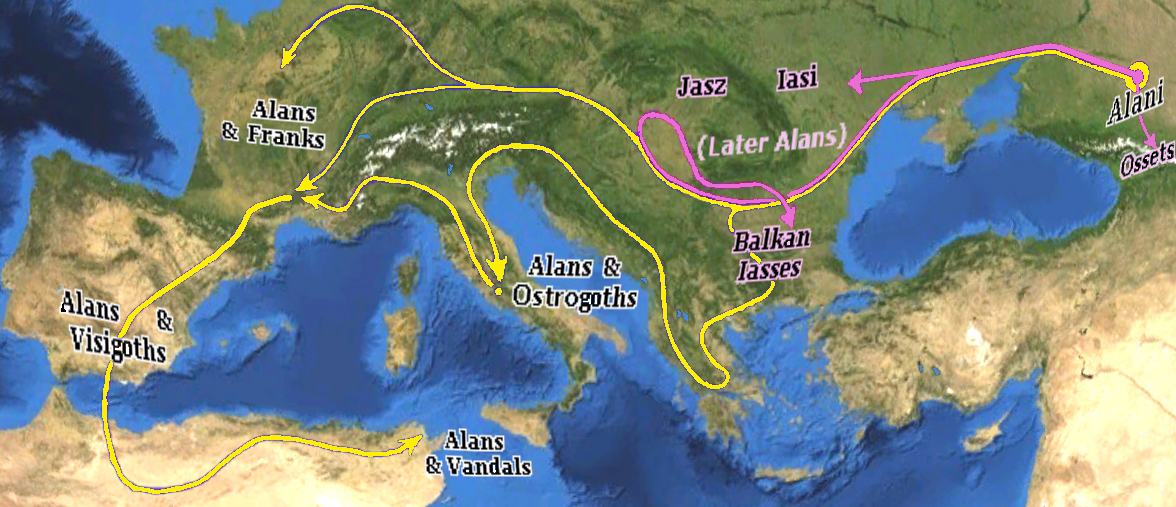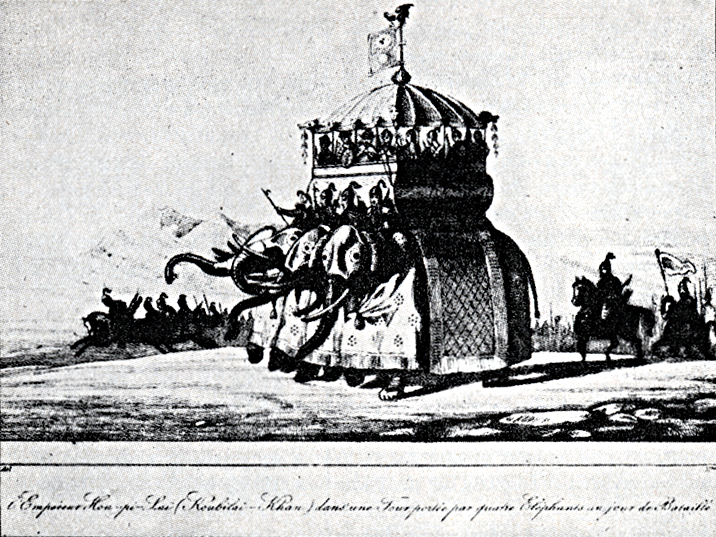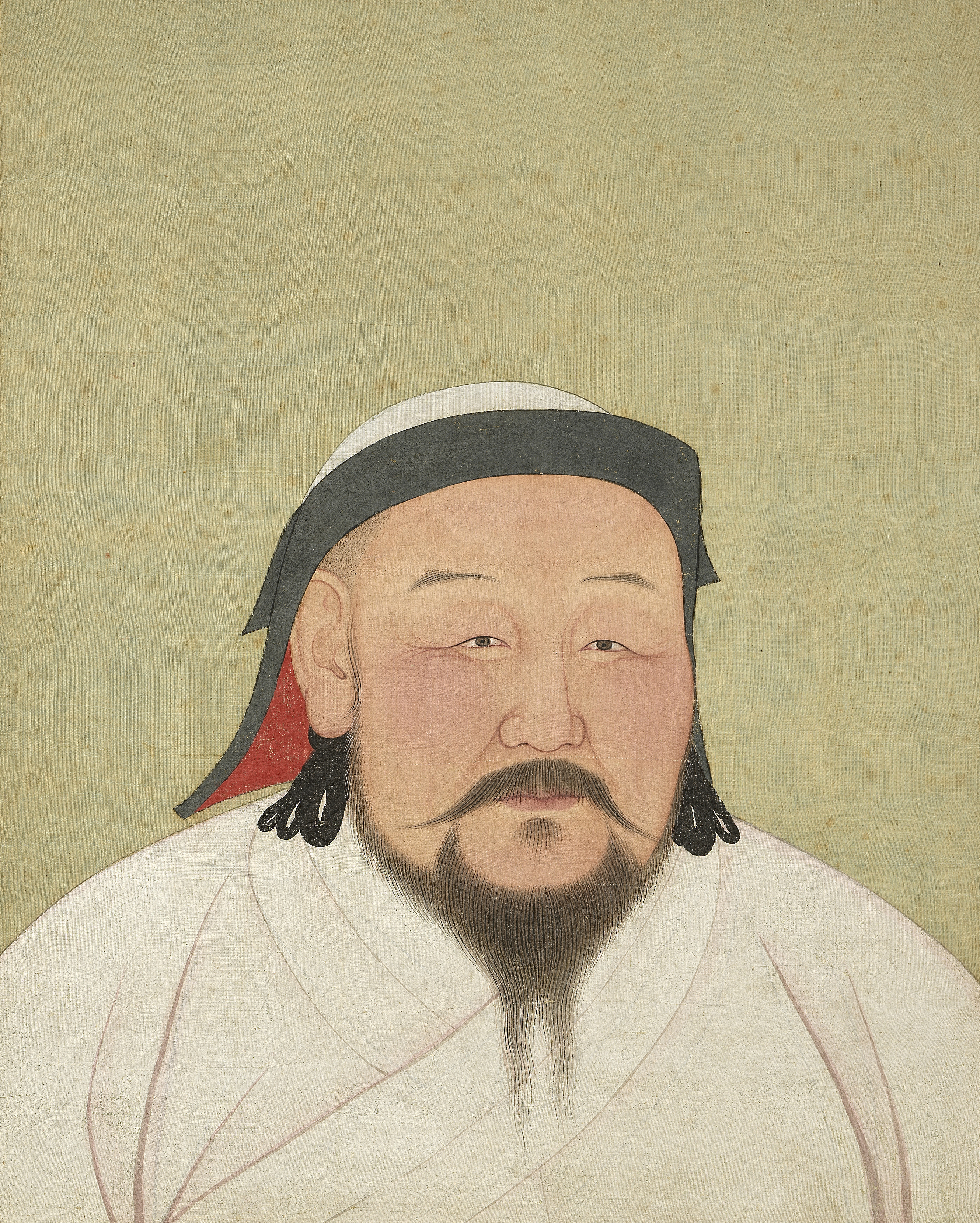|
Asud
The Asud ( Mongolian Cyrillic: , IPA: //) were a military group of Alani origin. The Mongol clan Asud is the plural of As, the Arabic name for the Alans. Against the Alans and the Cumans (Kipchaks), the Mongols used divide and conquer tactics by first telling the Cumans to stop allying with the Alans and after the Cumans followed their suggestion the Mongols then attacked the Cumans after defeating the Alans. Alans were recruited into the Mongol forces with one unit called "Right Alan Guard" which was combined with "recently surrendered" soldiers, Mongols, and Chinese soldiers stationed in the area of the former Kingdom of Qocho and in Besh Balikh the Mongols established a Chinese military colony led by Chinese general Qi Kongzhi (Ch'i Kung-chih). Alan and Kipchak guards were used by Kublai Khan. In 1368 at the end of the Yuan dynasty in China Toghan Temür was accompanied by his faithful Alan guards. ''Mangu enlisted in his bodyguard half the troops of the Alan prince, Arslan ... [...More Info...] [...Related Items...] OR: [Wikipedia] [Google] [Baidu] |
Alans
The Alans () were an ancient and medieval Iranian peoples, Iranic Eurasian nomads, nomadic pastoral people who migrated to what is today North Caucasus – while some continued on to Europe and later North Africa. They are generally regarded as part of the Sarmatians, and possibly related to the Massagetae. Modern historians have connected the Alans with the Central Asian Yancai of China, Chinese sources and with the Aorsi of Ancient Rome, Roman sources. Having migrated westwards and becoming dominant among the Sarmatians on the Pontic–Caspian steppe, the Alans are mentioned by Roman sources in the . At that time they had settled the region north of the Black Sea and frequently raided the Parthian Empire and the South Caucasus provinces of the Roman Empire. From the Goths broke their power on the Pontic Steppe, thereby assimilating a sizeable portion of the associated Alans. Upon the Huns, Hunnic defeat of the Goths on the Pontic Steppe around , many of the Alans migrated w ... [...More Info...] [...Related Items...] OR: [Wikipedia] [Google] [Baidu] |
Mongol
Mongols are an East Asian ethnic group native to Mongolia, China (Inner Mongolia and other 11 autonomous territories), as well as the republics of Buryatia and Kalmykia in Russia. The Mongols are the principal member of the large family of Mongolic peoples. The Oirats and the Buryats are classified either as distinct ethno-linguistic groups or as subgroups of Mongols. The Mongols are bound together by a common heritage and ethnic identity, descending from the Proto-Mongols. Their indigenous dialects are collectively known as the Mongolian language. The contiguous geographical area in which the Mongols primarily live is referred to as the Mongol heartland, especially in discussions of the Mongols' history under the Mongol Empire. Definition Broadly defined, the term includes the Mongols proper (also known as the Khalkha Mongols), Buryats, Oirats, the Kalmyks and the Southern Mongols. The latter comprises the Abaga Mongols, Abaganar, Aohans, Arkhorchin, Asud, Baarins, ... [...More Info...] [...Related Items...] OR: [Wikipedia] [Google] [Baidu] |
Kublai Khan
Kublai Khan (23 September 1215 – 18 February 1294), also known by his temple name as the Emperor Shizu of Yuan and his regnal name Setsen Khan, was the founder and first emperor of the Mongol-led Yuan dynasty of China. He proclaimed the dynastic name "Great Yuan" in 1271, and ruled Yuan China until his death in 1294. Kublai was the second son of Tolui by his chief wife Sorghaghtani Beki, and a grandson of Genghis Khan. He was almost 12 when Genghis Khan died in 1227. He had succeeded his older brother Möngke as Khagan in 1260, but had to defeat his younger brother Ariq Böke in the Toluid Civil War lasting until 1264. This episode marked the beginning of the division of the Mongol Empire. Kublai's real power was limited to the Yuan Empire, even though as Khagan he still influenced the Ilkhanate and, to a significantly lesser degree, the Golden Horde. In 1271, Kublai established the Yuan dynasty and formally claimed orthodox succession from prior Chinese dynasties. ... [...More Info...] [...Related Items...] OR: [Wikipedia] [Google] [Baidu] |
Beshbalik
Beshbalik ( zh, t=別失八里, s=别失八里, first=t) is an ancient Turkic archaeological site, now located in Jimsar County, Changji Hui Autonomous Prefecture, Xinjiang, China. The ancient city was initially called Beiting () or Ting Prefecture (), and was the headquarters of the Beiting Protectorate during the 8th century. It was later known as Beshbalik (Old Uyghur: ''beš balık'' “five cities”) and became one of the capitals of the Uyghur Khaganate and then the Kingdom of Qocho. Etymology The name of ''tíng'' 庭 (“court”) comes from this place of being a royal residence of the Further Jūshī 車師 people. Its Old Turkic name, Bešbalık “five cities” (''beš'' ”five” + ''balık'' “city”), comes from the fact that it was composed of five cities. This is made clear by a passage in the Old Book of Tang: 金滿流沙州北,前漢烏孫部舊地,方五千里。後漢車師後王庭。胡故庭有五城,俗號「五城之地」。貞觀十� ... [...More Info...] [...Related Items...] OR: [Wikipedia] [Google] [Baidu] |
Mongol Conquest Of The Song Dynasty
The Mongol conquest of the Song dynasty (or Song–Yuan War) was the final phase of the Mongol conquest of China, beginning under Ögedei Khan () and being completed under Kublai Khan () . It is considered the last great military achievement of the Mongol Empire; upon its completion, the Mongols ruled all of continental East Asia under the Han-style Yuan dynasty that had been founded as a division of the Mongol Empire. Background Before the Mongol–Jin war escalated, an envoy from the Song dynasty of China arrived at the court of the Mongols, perhaps to negotiate a united offensive against the Jin dynasty, who the Song had previously fought during the Jin–Song wars. While Genghis Khan refused during his life, upon his death in 1227 he bequeathed a plan to attack the Jin capital by passing through Song territory. Subsequently, a Mongol ambassador was killed by the Song governor in uncertain circumstances. Before receiving any explanation, the Mongols marched throug ... [...More Info...] [...Related Items...] OR: [Wikipedia] [Google] [Baidu] |
Yuan Dynasty
The Yuan dynasty ( ; zh, c=元朝, p=Yuáncháo), officially the Great Yuan (; Mongolian language, Mongolian: , , literally 'Great Yuan State'), was a Mongol-led imperial dynasty of China and a successor state to the Mongol Empire after Division of the Mongol Empire, its division. It was established by Kublai (Emperor Shizu or Setsen Khan), the fifth khagan-emperor of the Mongol Empire from the Borjigin clan, and lasted from 1271 to 1368. In Chinese history, the Yuan dynasty followed the Song dynasty and preceded the Ming dynasty. Although Genghis Khan's enthronement as Khagan in 1206 was described in Chinese language, Chinese as the Han Chinese, Han-style title of Emperor of China, Emperor and the Mongol Empire had ruled territories including modern-day northern China for decades, it was not until 1271 that Kublai Khan officially proclaimed the dynasty in the traditional Han style, and the conquest was not complete until 1279 when the Southern Song dynasty was defeated in t ... [...More Info...] [...Related Items...] OR: [Wikipedia] [Google] [Baidu] |
Mongolian Cyrillic Alphabet
The Mongolian Cyrillic alphabet ( Mongolian: , or , ) is the writing system used for the standard dialect of the Mongolian language in the modern state of Mongolia. It has a largely phonemic orthography, meaning that there is a fair degree of consistency in the representation of individual sounds. Cyrillic has not been adopted as the writing system in the Inner Mongolia region of China, which continues to use the traditional Mongolian script. History Mongolian Cyrillic is the most recent of the many writing systems that have been used for Mongolian. It uses the same characters as the Russian alphabet except for the two additional characters Өө and Үү . It was introduced in the 1940s in the Mongolian People's Republic under Soviet influence, after two months in 1941 where Latin was used as the official script, while Latinisation in the Soviet Union was in vogue. On 1 January 1946, the Mongolian language officially adopted the Cyrillic alphabet. The Cyrillic script ... [...More Info...] [...Related Items...] OR: [Wikipedia] [Google] [Baidu] |
Kingdom Of Dali
The Dali Kingdom, also known as the Dali State (; Bai language, Bai: Dablit Guaif), was a Bai people, Bai dynastic state situated in modern Yunnan province, China, from 937 to 1253. In 1253, it was Mongol conquest of China, conquered by the Mongols. However, descendants of its ruling house continued to administer the area as ''tusi'' chiefs under the Yuan dynasty rule until Ming conquest of Yunnan in 1382.. The former capital of the Dali Kingdom remains known as Dali City, Dali in modern Yunnan Province today. Name The Dali Kingdom takes its name from Dali City. Famed for its high quality marble, Dali (dàlǐ 大理) literally means "marble" in Chinese. History Origins Nanzhao was overthrown in 902 and three dynasties ruling successor kingdoms called Great Changhe (903-927), Great Tianxing (927-928), and Great Yining (928-937) followed in quick succession before Duan Siping seized power in 937, establishing himself at Dali City, Dali. The Duan clan professed to have Han Ch ... [...More Info...] [...Related Items...] OR: [Wikipedia] [Google] [Baidu] |
Mongol Invasion Of China
The Mongol conquest of China was a series of major military efforts by the Mongol Empire to conquer various empires ruling over China for 74 years (1205–1279). It spanned over seven decades in the 13th century and involved the defeat of the Jin dynasty, Western Liao, Western Xia, Tibet, the Dali Kingdom, the Southern Song, and the Eastern Xia. The Mongol Empire under Genghis Khan started the conquest with small-scale raids into Western Xia in 1205 and 1207. In 1279, the Mongol ruler Kublai Khan formally established the Yuan dynasty in the Chinese tradition, having crushed the last Song resistance, marking the reunification of China under Mongol rule, the first time that non- Han people had ruled the entire country. It was the first time that Tibet was unified with the rest of China. Conquest of Western Xia In the early 1200s, Temujin, soon to be known as Genghis Khan, began consolidating his power in Mongolia. Following the death of the Kerait leader Ong Khan to T ... [...More Info...] [...Related Items...] OR: [Wikipedia] [Google] [Baidu] |
Karakorum
Karakorum (Khalkha Mongolian: Хархорум, ''Kharkhorum''; Mongolian script:, ''Qaraqorum'') was the capital city, capital of the Mongol Empire between 1235 and 1260 and of the Northern Yuan, Northern Yuan dynasty in the late 14th and 15th centuries. Its ruins lie in the northwestern corner of the Övörkhangai Province of modern-day Mongolia, near the present town of Kharkhorin and adjacent to the Erdene Zuu Monastery, which is likely the oldest surviving Buddhist monastery in Mongolia. They are located in the upper part of the World Heritage Site Orkhon Valley. History Founding The Orkhon valley was a center of the Xiongnu, Göktürks, Göktürk, and Uyghur Empire, Uyghur empires. To the Göktürks, the nearby Khangai Mountains had been the location of the Ötüken (the locus of power), and the Uyghur capital Karabalgasun was located close to where later Karakorum would be erected (downstream the Orkhon River 27 km north–west from Karakorum). This area is ... [...More Info...] [...Related Items...] OR: [Wikipedia] [Google] [Baidu] |
Bayan Of The Baarin
Bayan of the Baarin (Mongolian language, Mongolian: Баян; 1236 – January 11, 1295), or Boyan () was an ethnic Mongols, Mongol general of the Yuan dynasty of China. He was known to Marco Polo as "Bayan Hundred Eyes" (probably from a confusion with ). He commanded the army of Kublai Khan against the Song dynasty#Southern Song, 1127–1279, Southern Song dynasty, ushering in the Southern Song collapse and the conquest of southern China by the Yuan dynasty. "Bayan" literally means "rich" in the Mongolian language. Background Born a grandnephew of Nayagha, a general under Genghis Khan, Bayan came from the Mongol Baarin tribe. Nayagha, together with Bayan's grandfather Alagh and Alagh's and Nayagha's father Shirgügetü Ebügen, appear in the ''Secret History of the Mongols''. Early career His grandfather Alagh was the viceroy in Khorazm province under the Mongol Empire. Bayan's father died during the Mongol siege of the stronghold of the Assassins (sect), Assassins (''Has ... [...More Info...] [...Related Items...] OR: [Wikipedia] [Google] [Baidu] |
Ariq Böke
Ariq Böke (after 1219–1266), the components of his name also spelled Arigh, Arik and Bukha, Buka (, ; ), was the seventh and youngest son of Tolui and a grandson of Genghis Khan. After the death of his brother the Great Khan Möngke, Ariq Böke claimed the title of the Khagan, Great Khan of the Mongol Empire and briefly took power while his brothers Kublai Khan, Kublai and Hulagu Khan, Hulagu were absent from the Mongolian Plateau. When Kublai returned for an election in 1260, rival factions could not agree, and elected both claimants, Kublai and Ariq Böke, to the throne, resulting in the Toluid Civil War that Division of the Mongol Empire, fragmented the Mongol Empire. Ariq Böke was supported by the traditionalists of the Mongol Empire, while his brother Kublai was supported by the senior princes of North China and Manchuria. Early years Ariq Böke was the youngest son of Sorghaghtani Beki and Tolui, the youngest son of Genghis Khan. When Genghis died in 1227, the leadership ... [...More Info...] [...Related Items...] OR: [Wikipedia] [Google] [Baidu] |









